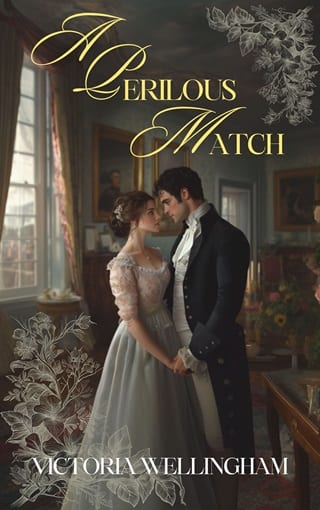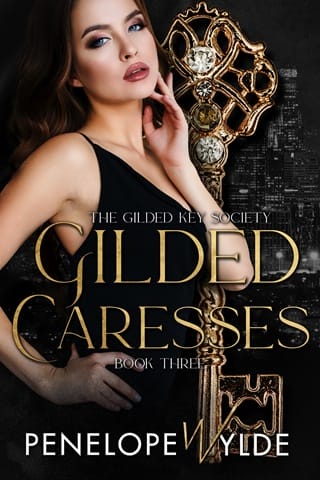Chapter 10
E lizabeth knew she ought to be gratified that Mr Darcy—she still could not think of him as Lord Dorset—had honoured her request for discretion. Indeed, when his second proposal had arrived, she had been resolute in her intent to refuse. Yet his private plea, accompanied by the most judicious arguments, had caused her to reconsider. Besides, she had felt a certain hesitation at the thought of issuing another refusal, particularly after the stern rebuke she had delivered to him not long ago.
But what had prompted him to ask in the first place? It seemed so imprudent. Or was it? He was not an imprudent man, she acknowledged, having come to a greater understanding of his character since their last parting. Her esteem for him had grown significantly, and she could not deny that she found him both handsome and intelligent, nor that she took pleasure in his company.
But love? Affection? She could not bring herself to confess to such feelings. It would be too bold.
And she was certain her assessment of the situation was correct. They would both be miserably unhappy if she agreed to this marriage. He would inevitably resent her for not loving him, and she would resent him for preventing her from ever marrying for love. Even if it was a practical match that would secure her family’s future and break the entail.
Elizabeth sighed, her thoughts in turmoil, when a knock at the door interrupted her reverie. In short order, her aunt appeared.
“Elizabeth, you have a caller. Miss Georgiana Darcy is here,” her aunt announced, her tone tinged with amusement, hinting at the deeper connection with the Darcy family. Elizabeth rose, smoothing her skirts before stepping into the hall.
The young woman greeted her with a broad smile, eyes sparkling as she removed her bonnet.
“Miss Bennet, it is so lovely to see you. I hope you do not mind my calling without notice.”
“Not in the least. Would you care for a cup of tea?” Elizabeth gestured towards the drawing room, while her aunt discreetly withdrew to the library to give them privacy.
“Heavens, no. I have just come from the cakehouse and consumed more tea and cake than I ought. If anything, I would not mind taking the air.”
Elizabeth motioned towards the garden. “My uncle’s garden is small, but there is a path that loops around the pond, if you care to join me there.”
She could not fathom the purpose of this visit. Had her brother perhaps sent her to ascertain Elizabeth’s decision regarding his proposal? But no, Mr Darcy had made it clear that he would not importune his sister. His protective nature towards her was something Elizabeth had observed during their dinner.
As they stepped outside, Georgiana smiled, taking in the garden. “What a quaint space. I adore it.”
Quaint, Elizabeth thought, was likely a euphemism for small. She could hardly blame the young woman, given that her home, Pemberley, was reputed to be grand, and she was undoubtedly accustomed to large estates.
“I am certain your estate in Derbyshire is lovely,” Elizabeth remarked.
“It is, but I enjoy the bustle of town occasionally, do you not agree? One can tire of the country.”
“Indeed. But I suppose you will spend more time in town now that your brother will serve in Parliament.”
Georgiana pursed her lips. “I imagine so. He likes to keep me close, especially after—” She stopped abruptly, biting her lip and shuffling her foot in the sand.
“I must take you into my confidence, Miss Bennet,” she began, eyes fixed on the ground.
“Then I must insist you call me Elizabeth. Two young women involved in a confederacy must use their Christian names, I declare,” Elizabeth said, hoping to ease the tension.
“Very well, Elizabeth. I must confess that I have come here without my brother’s knowledge. Not that he would have minded—he is very fond of you indeed. Which is why I have come.”
She raised her eyes, and Elizabeth saw a pleading in them that only deepened her confusion.
“Pray, what is it, Georgiana?”
“I have learnt of his proposal to you. I overheard him discussing it with our cousin, Colonel Fitzwilliam. I should not have continued to listen, but the truth is, I am fond of you, Elizabeth. I adore the idea of having you as a sister-in-law, and when I heard that you had rejected my brother, I felt obliged to speak to you.”
Elizabeth gulped, feeling a pang of guilt not only because of Georgiana’s clear affection for her brother but also because she was uncertain which proposal the young woman referred to.
“It has not escaped my notice that our brother is a fine gentleman. Any lady would be fortunate to have him, but I fear I am quite beneath his station, and—”
“Elizabeth,” Georgiana interrupted gently. “I have always believed in the virtue of honesty, and as such, I must insist that you listen to what I have to say before you speak further. Would you do me that honour?”
“Of course,” Elizabeth replied, taken aback by Georgiana's earnestness.
“I also overheard that one of the reasons you are hesitant to wed my brother is because of Mr Wickham and the truth my brother has kept from you about his character. I have come today to tell you what my brother could not—for my reputation’s sake.”
“There is no need to confide such personal matters, Georgiana,” Elizabeth interjected quickly, not wishing to compel the young woman to expose her soul merely for her brother’s sake. Yet she sensed her words were in vain.
“I must. You may already know that my father favoured Mr Wickham, though none of us could understand why. What you do not know is that I, too, was terribly fond of him once. After Fitzwilliam sent him away from Pemberley, I was distraught, for I missed his cheerful company. Where he had gone, I did not know, but then, last summer, he came to my notice again.”
Elizabeth’s heart sank as she realised that Georgiana was the reason Lord Dorset had been so guarded whenever she asked about Mr Wickham. She wanted to urge Georgiana to refrain from sharing more, but the determination in the usually shy young woman’s eyes was unmistakable.
“I trust you to keep my confidence,” Georgiana continued, and Elizabeth nodded solemnly. “I was taken from school last year and went to Ramsgate with a lady who presided over my accommodation in London. Mr Wickham appeared there as well, to my great delight, for I had missed him so. I later discovered that his presence was no coincidence, but a deliberate design. He—along with Mrs Younge—recommended himself to me so persuasively that I thought myself in love. Foolishly, I believed he loved me as I loved him.”
The pain in Georgiana’s voice was palpable, and Elizabeth struggled against the impulse to reach out and comfort her.
“He wished us to elope and marry, though I felt uneasy about it, having always dreamed of my brother’s presence at my wedding. Still, George persuaded me that we should keep our plans secret, given my brother’s dislike of him. I reluctantly agreed. However, Fitzwilliam arrived unexpectedly the day before our intended elopement, and upon seeing him, I found I could not go through with it. I confessed the truth. How my brother truly felt, I cannot say, for he always considers my feelings, but he sent Mr Wickham away and dismissed Mrs Younge. I felt terribly foolish, but Fitzwilliam was all grace and kindness, offering me comfort. It is a shameful story, one that could haunt me should society ever learn of it.”
Elizabeth was shaken by the tale. She had come to understand Mr Wickham as a scoundrel, but this—to deceive a young girl for her fortune and to spite her brother—was beyond comprehension.
How wrong she had been to judge Mr Darcy so harshly. She had already begun to reassess her opinion, but this revelation confirmed that he was indeed a man of honour.
Could it be that his distrust of others stemmed from this experience? She could only imagine what it was like to always be second in his father’s esteem to a man of questionable character, and then to have that same man attempt to steal away his sister. Perhaps his actions, even his seemingly irrational concerns regarding Jane, could be partially explained by this history.
“I must thank you for the confidence you have shown me, Georgiana. It cannot have been easy.”
“It is a most undignified tale, but when I heard of your reluctance to accept my brother’s proposal, and that it was due in part to this, I could not hesitate. I had to come and speak to you, for you must know, my brother ardently admires you.”
Elizabeth’s cheeks coloured with embarrassment. She did not doubt the gentleman’s feelings; the trouble lay in her uncertainty about her own. Yet she now realised that many of her apprehensions had been founded on falsehoods spread by Mr Wickham.
“Will you promise to consider my tale as you reflect on my brother’s offer?”
“I will. It is a promise I make gladly,” Elizabeth assured her, and she meant it.
“Good. I must take my leave now, Elizabeth. But I am grateful to you for listening.”
With that, Elizabeth escorted Miss Darcy to the door and saw her to her carriage. As the vehicle ambled away, she crossed her arms, feeling uncertain about what to do with this unexpected information.
“Is it indeed so dire?” her aunt’s voice called from the parlour, drawing her from her thoughts.
“It is, I am afraid. Longbourn is in a dreadful state. Heaven knows I admire my brother-in-law, but he is no businessman. A pity about Mr Bingley, for a son-in-law with five thousand pounds per annum would have greatly eased the situation.”
Elizabeth frowned. What were they talking about?
“Well, I now understand why Mr Bennet declined your offer to help raise the funds to break the entail,” her aunt continued, sounding dismayed.
“He would never be able to repay it, not with debts amounting to nearly the same. Even if he could raise the funds to break the entail, Longbourn would be burdened with debt, and my brother-in-law Bennet would be left to face the consequences alone.”
Elizabeth suppressed a gasp. She had known her father was not a skilled landowner and that he struggled with managing the estate, but she had not realised the extent of their financial troubles. Her mind raced ahead of her heart, seeking a solution.
“If only one of the girls wed well,” her aunt sighed deeply. “It would solve everything.”
“Yes, it would. But unless Mr Bingley makes an offer post-haste, I do not see how it will end well,” her uncle replied. The conversation then turned to more cheerful topics, but Elizabeth was left to ponder what she had overheard. She knew she must take it into account as she considered Mr Darcy’s proposal.
Marriage, she knew, was the answer. But could she bring herself to abandon all hopes of a love match? Or was she merely preventing herself from considering that a love match might be possible—with the very man she had censured so severely that she had thought never to see him grace her doorstep again?
 Fullepub
Fullepub 



